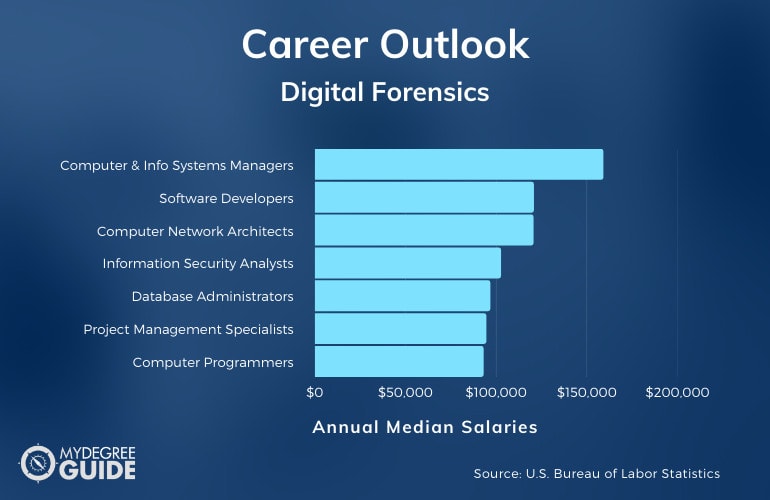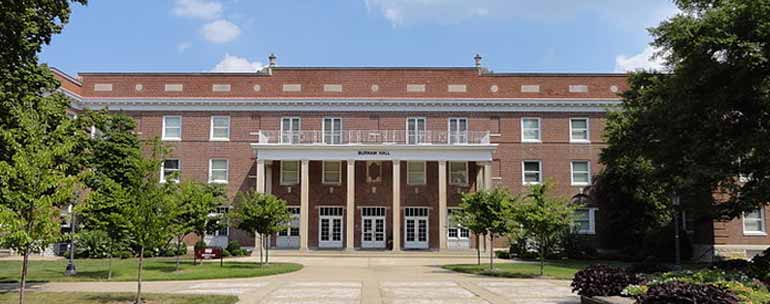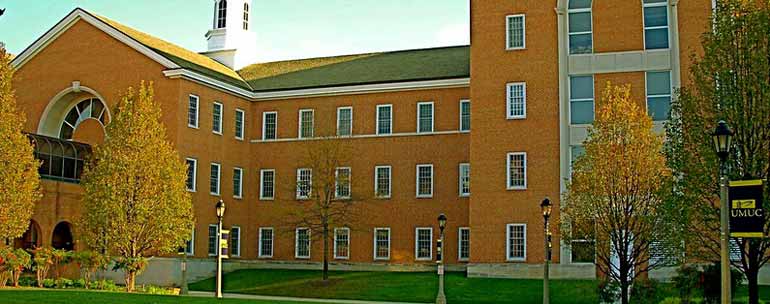If you are looking to start or advance a career in the field of digital forensics, pursuing a digital forensics graduate certificate could be a strategic move.

With the increasing reliance on technology in our personal and professional lives, the demand for skilled digital forensic professionals is rising.
Editorial Listing ShortCode:
A digital forensics graduate certificate program can help you develop the skills and knowledge necessary to investigate computer and cyber crimes. Many certificate programs also aim to prepare you for industry certification exams.
Online Digital Forensics Graduate Certificate Programs

If the idea of solving complex puzzles in the cybersecurity space excites you, then pursuing an online digital forensics graduate certificate program could be a beneficial choice. Digital forensics graduate certificate programs are academic courses that aim to provide you with career-oriented training in theoretical and practical skills for investigating cybercrimes.
Certificate programs are flexible and useful for people who want to further their studies and enhance their skill sets without enrolling in a master’s program. Many certificate courses are also capable of transferring into a master’s program, though, down the road. Depending on your background, you could take up the course to advance your career or qualify for entry-level jobs in digital forensics.
Online digital forensics graduate certificate programs can help you build a strong background in digital investigation, network forensics, access methods, cybercrime, and criminal justice. You could learn how to identify the causes of digital crime as well.
Here are some of the topics covered in this type of graduate certificate program:
- Operating systems
- Network systems
- Data recovery
- Mobile device analysis
- Cyber defense
- Laws related to computer forensics
- Digital evidence collection
- Scripting for digital forensics
Common topics aim to expose you to operating systems, digital network and systems design, common vulnerabilities, vectors of attacks, and techniques used to conduct digital investigations.
Editorial Listing ShortCode:
The program also covers how to identify and preserve digital evidence, present findings for potential legal action, and understand the psychology and motivations of malicious actors in the digital sphere. Many institutions design these programs to prepare students for digital and computer forensic professional certification examinations.
Here are some of the different industry organizations that offer professional certifications:
- Electronic Commerce Consultants (EC-Council)
- International Association of Computer Investigative Specialists (IACIS)
- Information Assurance Certification Review Board (IACRB)
If your goal is to prepare for one of these examinations, it’s advisable to check whether a graduate certificate program covers the needed topics for your desired certification.
Various career paths in digital forensics include:
- Computer forensics investigator
- Digital forensics analyst
- Forensic computer examiner
- Information security analyst
A graduate certificate program equips students with advanced knowledge in their chosen area of study. Enhanced skill sets as well as industry certification can help you further your professional or academic path in the discipline.
Digital Forensic Science Careers & Salaries

With an increase in cyberattacks and cybercrimes, the demand for experts in digital forensics is on the rise. Government organizations and agencies use digital forensics experts in counterintelligence, network analysis, and threat mitigation. They’ll often identify vulnerabilities and investigate incidents.
The extensive use of technology within criminal activity has resulted in law enforcement using digital forensics as well. Computer and digital forensics analysts can extract data from electronic evidence, uncover digital evidence, and organize it into actionable intelligence for investigations and prosecutions.
Digital forensics can also help financial institutions protect themselves from malicious attacks and theft of funds. The field of digital forensics is also important in financial audits.
According to the Bureau of Labor Statistics, here’s a list of potential career paths related to the study of digital forensics.
| Careers | Annual Median Salaries |
| Computer and Information Systems Managers | $159,010 |
| Software Developers | $120,730 |
| Computer Network Architects | $120,520 |
| Information Security Analysts | $102,600 |
| Database Administrators | $96,710 |
| Project Management Specialists | $94,500 |
| Computer Programmers | $93,000 |
| Network and Computer Systems Administrators | $80,600 |
| Computer Network Support Specialists | $62,760 |
| Forensic Science Technicians | $61,930 |
Your specific salary will be determined by a number of factors, such as level of proficiency, prior experience, degree specialization, and chosen industry. Overall, occupations in the field of digital forensics generally have a faster than average employment growth rate.
Editorial Listing ShortCode:
More organizations and individuals are using internet-based solutions—like emails and cloud-based products—for daily operations, increasing the need for cybersecurity in many industries. For instance, digital forensics and cybersecurity professionals can help financial institutions protect themselves from malicious attacks and theft of funds. The field of digital forensics is also important in financial audits.
Digital Forensics Graduate Certificate Curriculum & Courses

The coursework for a digital or cyber forensics graduate certificate differs from program to program, but here are some common course examples:
- Forensic Acquisition and Analysis: This course exposes learners to best practices in digital forensic acquisition, analysis, authentication, and methods of acquiring data.
- Advanced Topics in Network and Systems Security: You’ll learn network security issues like encryption, authentication, traceback, and forensics in both wired and wireless networks.
- Digital Evidence Recognition: This course covers evidence law, the preservation process, and how to present it for a trial in court.
- Network Security Concepts: You’ll learn the fundamentals of cybersecurity, network security, and database vulnerabilities.
- Malware Analysis: You’ll learn about techniques that analyze different malware programs, like botnets, rootkits, and Trojan horses.
- Trends in Digital Forensics: This course aims to keep you up to date with new trends in digital forensics and to equip you with skills to research new techniques.
- Mobile Device Analysis: This course includes content on identification, collection, acquisition, and preservation of data from mobile devices as well as the tools used in the process.
- Intrusion Detection: This course covers theories, scientific methods, and hands-on skills to detect intrusion in a network, attack vectors, and implement possible prevention methods.
- Operating Systems Analysis: This course exposes you to common operating systems in the cybercrime environment.
- Digital Evidence Acquisition: This course covers various aspects of the forensic acquisition process, such as preserving the integrity of digital data, minimal alteration of data, and copying versus imaging.
These courses may appear in an online digital forensics graduate certificate program as core courses or electives. Credits for these courses may also transfer to an online forensic science degree program, such as an online masters in digital forensics or an online crime scene investigator degree, for example, should you decide to continue on after earning your certificate.
Admissions Requirements

Here’s a list of general admission requirements for graduate certificate programs in digital forensics:
- Bachelor’s degree from an accredited institution
- Letters of recommendation
- Statement of purpose
- Minimum GPA of 3.0, on average
Some schools require prior knowledge of digital collection and technology. In some cases, non-native English speakers may be required to take a language assessment. It’s beneficial to check the detailed admission requirements of your preferred program.
Accreditation

It’s strategic to check the accreditation status of prospective schools. Regional accreditation ensures that a school meets the minimum quality standards when it comes to their curriculum, faculty, and learner outcomes.
Editorial Listing ShortCode:
Attending a school with regional accreditation might positively impact your ability to qualify for industry certifications, professional organizations, and career advancement. You can visit the Council for Higher Education Accreditation (CHEA) website to verify any school’s accreditation status.
Financial Aid and Scholarships

When pursuing a graduate certificate in cyber forensics, you may want to explore the financial aid options available to you. For starters, you can fill out the Free Application for Federal Student Aid (FAFSA) to see if you qualify for federal aid, such as student loans or work-study programs.
Some graduate certificate in digital forensics programs also offer discounts to criminal justice professionals. Veteran or military discounts are also common in many digital and computer forensics graduate certificate programs. Another other financial aid option to explore is scholarships. Scholarship programs may be offered by your prospective school, by public or private organizations, or by an employer.
What Can You Do with a Graduate Certificate in Digital Forensics?

A graduate certificate in digital forensics may open the doors to various career paths in the cybersecurity and digital forensics world.
Many professionals in this field may work as digital or computer forensics analysts, cyber investigators, malware analysts, or information security analysts. Many students enroll in graduate certificate programs not only to advance their skill sets but also to prepare for professional certification exams.
The career path that you pursue may depend on your chosen area of study as well as any industry certifications you’ve earned. A graduate certificate could also lay a foundation for a masters degree and higher learning.
How Long Is a Graduate Certificate Program in Digital Forensics?

Typically, online graduate certificates in digital forensics take 9 months to 1 year to complete. Certificate programs usually include 4 to 5 graduate courses that address practical aspects and skill sets of digital forensics.
The number of credits required by a graduate certificate program can differ significantly from institution to institution. How many courses you’re required to complete could affect your time to completion. Your full-time or part-time enrollment status and the program’s academic calendar could affect your timeline as well.
What’s the Difference Between a Graduate Certificate vs. Masters in Digital Forensics?
Although graduate certificate programs may share some overlapping courses with master’s degree programs in digital forensics, there are some key differences between the two educational paths.
| Graduate Certificate | Masters Degree |
|
|
At the graduate level, whether a digital forensics degree or certificate is best for you depends on your short-term and long-term career goals.
What’s the Difference Between a Digital Forensics Certification vs. Certificate?
Here are a few differences between a digital forensics certification and a graduate certificate.
| Digital Forensics Certificate | Digital Forensics Certification |
|
|
Many certificate programs are designed to prepare you or qualify you for a professional certification examination. Some employers may require workers to hold a particular digital forensics certification, depending on the company’s tools.
Is a Digital Forensics Graduate Certificate Worth It?

Yes, a digital forensics graduate certificate is worth it for many students. As technology evolves, more criminals take to digital crime, and more organizations need to mitigate potential threats. Many companies, agencies, individuals, and organizations need experts in digital forensics.
Editorial Listing ShortCode:
According to the Bureau of Labor Statistics, information security analysts and forensic science technicians are expected to see 33% job growth and 16% job growth, respectively, over the next ten years. Both of these career paths are growing much faster than average. A digital forensics graduate certificate can enable you to advance your skill sets and qualifications in this lucrative field.
Universities Offering Online Graduate Certificate in Digital Forensics Program
Methodology: The following school list is in alphabetical order. To be included, a college or university must be regionally accredited and offer degree programs online or in a hybrid format.

American Public University offers an online program for a Graduate Certificate in Digital Forensics. GRE and GMAT scores are not needed to apply. Courses start every month and are 8 to 16 weeks long. The certificate requires the completion of 18 credits, but students can transfer in up to 9 qualifying credits. Courses include Computer Forensics, Advanced Cybercrime Analysis, Information Security Management, and more.
APUS is accredited by the Higher Learning Commission.

Boston University offers a Graduate Certificate in Digital Forensics that can be earned online. The program requires the completion of 16 credits and can usually be completed in less than a year. The program has small class sizes to help ensure that students can get personalized attention, and its instructors have industry experience. The curriculum emphasizes hands-on learning.
Boston University is accredited by the New England Commission of Higher Education.

Champlain College offers a Graduate Certificate in Digital Forensic Science. Courses can be taken 100% online, and students can access their coursework at any time. The program includes two required courses, The Practice of Digital Investigations and Operating System Analysis. After completing those two courses, students are required to take two electives related to digital forensics.
Champlain College is accredited by the New England Commission of Higher Education.

DeSales University offers an online program for a Graduate Certificate in Digital Forensics. The program’s expert instructors emphasize applying theory to real-world problem-solving.
The online format is designed to provide flexibility. The certificate requires a total of four courses. These are Digital Investigation and Evidence Collection, Forensic Acquisition and Analysis, Network and Cloud Forensics, and Special Topics in Digital Forensics.
DeSales University is accredited by the Middle States Commission on Higher Education.

Eastern Kentucky University offers a Graduate Certificate in Cybersecurity and Digital Forensics. The program is 100% online and requires the completion of 12 credit hours. Each class is 8 weeks long, and there are five start dates each year. Students in the program have access to free online tutoring and career services.
Eastern Kentucky University is accredited by the Southern Association of Colleges and Schools Commission on Colleges.

Georgia Southern University offers a Graduate Certificate in Cybercrime that can be earned online. The program requires the completion of 12 credit hours and can potentially be finished in just one semester. Courses include Applied Digital Forensics 1 and 2, Legal Aspect of Cybercrime, and one elective. All the courses are designed to count toward a master’s degree in criminal justice and criminology.
Georgia Southern University is accredited by the Southern Association of Colleges and Schools Commission on Colleges.

Stevenson University’s Graduate Certificate in Digital Forensics is available fully online. The certificate includes 18 credit hours of coursework that is designed to be counted toward a master’s in cybersecurity and digital forensics. The program aims to be convenient and accessible for working adults.
Stevenson University is accredited by the Commission on Higher Education, Middle States Association of Colleges and Universities.

The Computer Forensics Post-Baccalaureate Certificate program from Towson University aims to prepare students for IT careers that involve analyzing digital evidence. This is a hybrid program that includes both online and on-campus courses. All credits earned will transfer to Towson’s Master of Science in Applied Information Technology.
Towson University is accredited by the Middle States Commission on Higher Education.

The University of Maryland Global Campus offers an 18 credit Graduate Certificate in Digital Forensics and Cyber Investigation. The curriculum emphasizes hands-on experience with current technology. All courses can be taken online. Classes include Communicating, Problem Solving, and Leading in Cybersecurity, Cyberspace and Cybersecurity Foundations, and Digital Forensics and Technology Practices.
University of Maryland Global Campus is accredited by the Middle States Commission on Higher Education.

The University of Rhode Island offers a fully online program for a Digital Forensics Graduate Certificate. It typically takes 9 to 20 months to complete. Prospective students do not need any previous formal technical training to apply. Courses include Digital Forensics I, Introduction to Network and System Security, Advanced Digital Forensics, and a concentration course of the student’s choosing.
The University of Rhode Island is accredited by the New England Commission of Higher Education.
Getting Your Digital Forensics Graduate Certificate Online

The digital forensics field is a fast-growing industry. Similar to other areas in tech, many industries require digital forensics experts due to the increased use of technology, which also results in an increase of digital and cyber crimes.
A digital forensics graduate certificate could help you advance your skill sets in this field. This could include your ability to collect digital evidence and organize it for persecution of digital crimes offenders. Pursuing a graduate certificate could help prepare you for various career paths or for industry certification. Enhancing your qualifications could also increase your chances of job advancement.
With so many credible graduate certificate programs available online, you are likely to find one that fits your personal and professional needs. Why not start exploring graduate certificates from accredited colleges and universities today?

